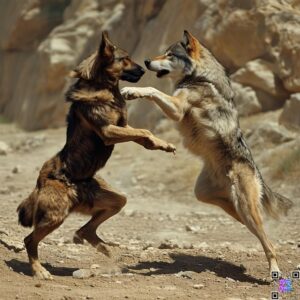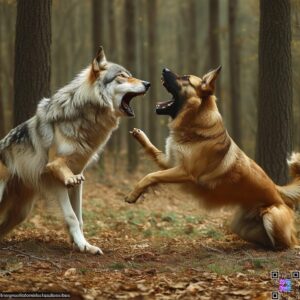Introduction
The Anatolian Shepherd is an ancient breed that has its roots in the Anatolian region of Turkey, also known as the historical Anatolia. This rugged and resilient breed has been used for centuries by Turkish shepherds to protect their flocks from predators, including the fearsome timber wolf. Artifacts dating back to 2000 B.C. describe a dog in Anatolia that closely resembles the modern-day Anatolian Shepherd, showcasing the breed’s long-standing legacy as a guardian of livestock.
Physical Characteristics and Capabilities of the Anatolian Shepherd

The Anatolian Shepherd is a large and powerful breed, with males typically weighing between 110 to 150 pounds and females ranging from 80 to 120 pounds. These dogs are known for their impressive size, muscular build, and thick, double-layered coats that provide protection against the elements. One of the most remarkable features of the Anatolian Shepherd is its formidable bite force, which can reach up to 700 pounds per square inch (psi) – even more powerful than that of a pit bull.
Understanding the Anatolian Shepherd
The Anatolian Shepherd has a rich history that dates back thousands of years. Originating from Turkey, these dogs were bred by nomadic shepherds to protect flocks from various predators, including wolves. Their lineage is steeped in tradition, reflecting a strong connection to the land and its challenges.
History and Origin of the Breed
The roots of the Anatolian Shepherd can be traced back to ancient times when they were essential companions to Turkish shepherds. These dogs were not just pets; they were invaluable partners in ensuring the safety of livestock. Their ability to work independently without constant supervision made them ideal for guarding flocks across vast landscapes.
Anatolian Shepherds as Livestock Guardian Dogs
The Anatolian Shepherd’s primary role has been that of a livestock guardian dog, responsible for protecting flocks of sheep, goats, and other livestock from predators. These dogs are fiercely independent and possess a strong instinct to take charge of their assigned territory. Their presence alone can often deter predators, as they are known to be bold and authoritative when confronting threats.
Anatolian Shepherds’ Ability to Defend Against Wolves
The Anatolian Shepherd’s size, strength, and protective instincts make them well-equipped to defend against the threat of wolves. These dogs have been used for centuries in Turkey to fend off wolf packs, and their reputation for successfully taking on wolves has followed them to other parts of the world. Anatolian Shepherds are known to work in teams, with multiple dogs coordinating their efforts to overwhelm and subdue a wolf.
Factors Influencing the Outcome of an Anatolian Shepherd vs. Wolf Encounter
While Anatolian Shepherds are formidable opponents, the outcome of a confrontation with a wolf can be influenced by several factors. The size and age of the wolf, the number of Anatolian Shepherds involved, and the specific circumstances of the encounter can all play a role in determining the victor. Additionally, the training and socialization of the Anatolian Shepherd can impact its ability to effectively defend against a wolf.
Anatolian Shepherds Protecting Livestock from Wolves
There are numerous real-life examples of Anatolian Shepherds successfully protecting livestock from wolf attacks. In remote areas of Turkey, these dogs have been instrumental in deterring and even defeating wolf packs that threaten the livelihoods of shepherds and ranchers. Their presence alone is often enough to scare off wolves, but when confronted, Anatolian Shepherds have demonstrated their willingness and ability to engage in fierce battles to defend their charges.
Anatolian Shepherds Defending Against Grizzly Bears and Other Predators
The Anatolian Shepherd’s impressive capabilities extend beyond just wolves. These dogs have also been known to successfully defend against other large predators, such as grizzly bears and mountain lions. Their size, strength, and fearless nature make them a formidable opponent for any animal that threatens their flock or territory.
Anecdotal Evidence of Anatolian Shepherds Defeating Wolves
While there are numerous accounts of Anatolian Shepherds successfully defending against wolves, it’s important to note that not all encounters end with the dog as the victor. Wolves are also highly capable predators, and a single Anatolian Shepherd may not always be able to overcome a large, experienced wolf. However, there are many anecdotal reports of Anatolian Shepherds working in teams to overwhelm and defeat wolf packs, showcasing the breed’s remarkable abilities.
Advantages of Anatolian Shepherds in Wolf-Prone Areas
The Anatolian Shepherd’s reputation as a reliable and effective livestock guardian dog has made them a popular choice for ranchers and shepherds in areas with a high wolf population. These dogs’ natural instincts, combined with their size, strength, and protective nature, make them a valuable asset in deterring and defending against wolf attacks. Their presence can significantly reduce livestock losses and provide peace of mind for those who rely on their flocks for their livelihood.
Challenges and Limitations of Anatolian Shepherds Facing Wolves
While Anatolian Shepherds are undoubtedly formidable, they are not invincible. Wolves are also highly intelligent and adaptable predators, and they may employ tactics such as luring a single Anatolian Shepherd into an ambush or overwhelming it with a pack. Additionally, the Anatolian Shepherd’s independent nature can sometimes make them difficult to control, which can be a challenge in coordinating their defense against a wolf threat.
Importance of Proper Training and Socialization for Anatolian Shepherds
To ensure that Anatolian Shepherds can effectively fulfill their role as livestock guardians, it is crucial that they receive proper training and socialization from a young age. This helps to reinforce their protective instincts, while also ensuring that they are well-behaved and responsive to their owners’ commands. Proper training can also help Anatolian Shepherds work effectively in teams, which is often necessary when defending against larger predators like wolves.
Summarizing the Anatolian Shepherd’s Capabilities Against Wolves
The Anatolian Shepherd is a breed that has been honed over centuries to be a formidable defender of livestock, including against the threat of wolves. With their impressive size, strength, and bite force, Anatolian Shepherds have a well-earned reputation for successfully deterring and even defeating wolf attacks. While they may not always emerge victorious in a one-on-one confrontation, these dogs have proven time and again that they are a highly effective deterrent and protector when it comes to safeguarding their flocks.
The Continued Relevance of Anatolian Shepherds in Livestock Protection
As wolf populations continue to expand and pose a growing threat to livestock in many regions, the Anatolian Shepherd remains a highly valuable and sought-after breed for ranchers and shepherds. These dogs’ unwavering dedication to their duties, combined with their impressive physical capabilities, make them an invaluable asset in the ongoing battle to protect vulnerable livestock from predators. The Anatolian Shepherd’s legacy as a guardian of flocks is likely to continue for generations to come.

FAQs
1- Can a single Anatolian Shepherd kill a wolf?
While Anatolian Shepherds are highly capable of defending against wolves, a single dog may not always be able to overcome a large, experienced wolf. Anatolian Shepherds often work in teams to overwhelm and subdue wolf packs, as their coordinated efforts can be more effective than a solo dog.
2- How do Anatolian Shepherds compare to other livestock guardian breeds in terms of wolf-fighting abilities?
Anatolian Shepherds are generally considered one of the most capable livestock guardian breeds when it comes to defending against wolves. Their size, strength, and bite force make them a formidable opponent, and their independent and protective nature make them well-suited for the task. Other breeds like the Kangal and Caucasian Shepherd are also known for their wolf-fighting abilities, but the Anatolian Shepherd remains a top choice for many ranchers and shepherds.
3- What factors can influence the outcome of an Anatolian Shepherd vs. wolf encounter?
The outcome of an Anatolian Shepherd vs. wolf encounter can be influenced by several factors, including the size and age of the wolf, the number of Anatolian Shepherds involved, the specific circumstances of the encounter, and the training and socialization of the Anatolian Shepherd. In general, Anatolian Shepherds are more likely to prevail when working in teams and when they have been properly trained and socialized to handle such confrontations.
4- How effective are Anatolian Shepherds at protecting livestock from wolves in real-world situations?
Anatolian Shepherds have a long history of successfully protecting livestock from wolf attacks in their native Turkey and other parts of the world. There are numerous real-life accounts of these dogs deterring and even defeating wolf packs, often through their mere presence or coordinated efforts with other Anatolian Shepherds. While they may not always emerge victorious, Anatolian Shepherds have proven to be a highly effective deterrent and protector for vulnerable livestock.
5- Can Anatolian Shepherds defend against other large predators besides wolves?
Yes, Anatolian Shepherds have demonstrated their ability to defend against a variety of large predators, including grizzly bears, mountain lions, and even coyotes. Their size, strength, and protective instincts make them well-equipped to handle a wide range of threats to the livestock they are tasked with guarding.
6- What are some of the challenges and limitations of using Anatolian Shepherds to defend against wolves?
While Anatolian Shepherds are highly capable, they are not invincible. Wolves are also highly intelligent and adaptable predators, and they may employ tactics such as luring a single Anatolian Shepherd into an ambush or overwhelming it with a pack. Additionally, the Anatolian Shepherd’s independent nature can sometimes make them difficult to control, which can be a challenge in coordinating their defense against a wolf threat.
Conclusion
The Anatolian Shepherd is a truly remarkable breed, with a long and storied history as a protector of livestock against the threat of wolves and other predators. While these dogs may not always emerge victorious in a direct confrontation, their mere presence is often enough to deter wolves and other threats. For those living in areas with a high wolf population, the Anatolian Shepherd is undoubtedly a breed worth considering as a reliable and effective livestock guardian. In summary, the question “Can Anatolian Shepherd kill a wolf?” has a multifaceted answer rooted in history, biology, and real-world experiences.
These impressive dogs are not only capable guardians but also embody strength and loyalty that make them invaluable on farms worldwide. While encounters with wolves can be dangerous, the presence of an Anatolian often serves as a powerful deterrent against potential threats. Whether you’re considering adding one to your family or simply curious about this breed’s abilities, understanding their background helps appreciate what makes them so special in protecting livestock from predators like wolves.

